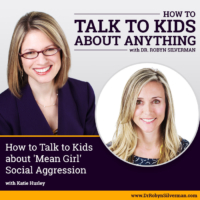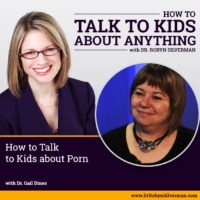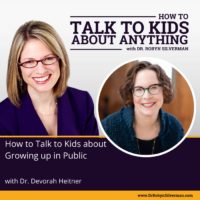Podcast: Play in new window | Download
Subscribe: Apple Podcasts | RSS | More
How to Talk to Kids about Fears & Phobias
This podcast focuses on talking to kids about fears and phobias. What is the difference between fears and phobias? What do we do (and what do we NOT do) when our child is showing signs of a phobia? What do we say when our child has a phobia—and what can we teach our child to say to him or herself to get through the discomfort of being impaired by intense fear? Dr. Andrea Umbach answers our questions and helps us understand how to help our children conquer their fears so they can live a rich life.
Special Guest: Dr. Andrea Umbach
Dr. Andrea Umbach is a licensed psychologist and specializes in treating anxiety, phobias, OCD, panic, hoarding, and trichotillomania. She practices from a cognitive-behavioral approach focused on increasing flexibility in thinking and making adaptive behavior changes. Dr. Umbach enjoys working with adults, teens, and kids in both individual and group formats as well as provides trainings, presentations, and consultations. She is the author of “Conquer Your Fears and Phobias for Teens” and founder to the Charlotte Anxiety Consortium. You can learn `more about Dr. Andrea Umbach at www.drandreaumbach.com
All people, young or old, experience fears or anxiety at one time or another in their lives. These feelings are often normal- even protective- because they tell us when we need to use caution, run, fight or get help. Kids may fear the dark, or spiders, or being separated from their parents- and much more. For children, coping with fear can even help them deal calmly with bigger fears as they get older and challenging situations get more, well, challenging. But what happens when fears are more relentless? When they are more than just normal, everyday anxieties and tend to stop us from doing what we want to do, need to do, live fully from day to day? What happens when it’s not just a fear- but a phobia? To figure all of this out- I am so glad we have Dr. Andrea Umbach on our show today.
The podcast provides:
- The difference between fears and phobias
- Common phobias
- Causes and treatments of phobias
- What NOT to do when it comes to phobias and kids
- Tips: How can parents and educators support children who have certain fears and phobias?
- Scripts: What to say or do when your child has a phobia
- Self talk phrases that can we helpful while a child is feeling fear.
Important Messages:
- Fears are not the same as phobias. Fears are emotions that are fleeting while phobias are all-encompassing, impairing and get in the way of life.
- There are 5 main common phobias- animals, natural environment, situational, injury and other.
- People will get phobias because of several reasons such as- genetics, negative experience, observation of others and their fearful response.
- Parents have to be careful with over-protection because we want our kids to take healthy risks.
- CBT- Cognitive Behavioral Therapy is available for kids with phobias
- FACE: Flexible thinking, Acceptance of thoughts and emotions, Coping skills and exposure- facing the fear.
- If you are concerned, have a professional assess how impairing the trigger is for the person.
- When we have a fear thought in our heads, it says that something horrible is going to happen.
- Exposure happens with baby steps.
- Don’t force it. If you force it, you will accelerate their fear. They need to be a willing participant.
- The expectation is not to be perfectly calm- it is to get through it even though it’s uncomfortable.
- Check your own reactions so you don’t escalate the fear reaction on their part.
- Don’t make promises that nothing bad will happen.
- Don’t make tons of accommodations for your child.
- Understand your child’s patterns and what maintains our child’s fear
- STAIRS: What are the Situations that are Triggering? What are the automatic interpretations? What is my child’s reaction? What are the safety behaviors that’s keeping this going?
- Every child is going to be different and we can’t assume we can use one blanket helping statement and it’s going to change everything.
- There are skills you are going to have to give the kids before they are in the situation- we have to do the prepwork.
- Children need to put encouraging phrases in their own words so that they can say it in their own heads and it makes sense to them.
Notable Quotables:
- “When it comes to phobias, it really doesn’t matter what the situation is, it matters how distressing and impairing it is for the person.”
- “We don’t want our kids to be afraid of everything. We want to balance a healthy sense of fear so that our kids can protect themselves with logical risk-taking.”
- “We want people to know that it is possible for these phobias to get better.”
- “We know that running away from fear just keeps the cycle going. It maintains the fear and means we have to keep repeating those safety behaviors over and over and avoiding the fear over and over again. And what we actually want is a long-term fix.”
- “We need to take baby steps with fear. Take one step closer, stay a little longer, tolerate the discomfort and the feelings we may have so that we can teach our brain and our body that it is not dangerous and that it’s okay. That’s the learning experience.”
- “You can’t force it. If you force it, you will accelerate their fear. They need to be a willing participant.”
- “Each time we take baby steps with fear, they’re building up their courage and seeing, ‘I can do this and I’m able to get through it.’”
- “When we see a child who is uncomfortable, our instinctual reaction is; ‘what do I do to make it better? How do I fix it? How do I make the pain or discomfort go away? And as our child’s anxiety increases, our anxiety increases and it starts to make everybody feel like there’s a crisis.
- “We are helping to accommodate, avoid or fix the problem but we need to give them the opportunity to work it out and deal with the natural consequences and feelings versus protecting them from it.”
- “We have to start normalizing these negative feelings that kids are having and teaching them that they are not bad and they actually have a purpose. We need to have a sit down discussion with kids is constantly giving them their own self talk of ‘how do I tolerate discomfort?’”
- “If your child is saying in their head; ‘my goal is to never feel uncomfortable,’ we need them to understand that those goals are not going to help them. They need to shift to a different kind of goal like; ‘I’m going to tolerate or I’m going to try to do things that are hard.’”
- “We want kids to be able to handle difficult situations versus not letting them have difficult situations ever to learn from.” *
- “The more confident you are in your kids that they can handle difficult situations, the more confident they will be.”
Resources:
http://www.charlotteparent.com/CLT/Blogs/The-Doctor-Is-In/Understanding-the-Patterns-of-Anxiety/
https://expertbeacon.com/what-can-i-do-my-anxious-child/#.WTQ0gGjyvid
http://www.psychbytes.com/help-someone-anxiety/
Conquer Your Fears and Phobias for Teens (book)
Freeing Your Child from Anxiety by Chansky
Anxious Kids, Anxious Parents by Wilson and Lyons
Great “self talk” phrases:
Tolerating Discomfort
-I can handle this feeling.
-I can get through this even though I’m uncomfortable.
-I have made it through tough times before.
-Feelings are temporary, I can wait it out.
-Nothing about these sensations or feelings is dangerous.
-I can take one step at a time.
-I don’t need to let these feelings stop me, I can keep going.
-This is an opportunity to build strength/resilience or practice feeling uncomfortable.
-I am safe enough.
-I’m stronger than I think.
-My courage will have rewards.
Approaching Exposures
-Today I’m willing to go just a little outside my comfort zone.
-Each time I choose to face my fear, I take another step toward becoming free.
-I know I’ll feel better once I’m actually in the situation.
-I’ll do the best I can.
-I praise myself for being willing to confront my fear.
-As I continue to practice, it will get easier.
Flexibility
-I don’t need to control this in order to be okay
-Maybe there are other ways to do this
-Different does not mean bad
-I don’t have to do this perfectly, I can let myself be human.
-What happens when I go with the flow?
Allowing for Uncertainty
-There are a lot of questions that cannot be answered
-Maybe this will happen, maybe it won’t
-Surprises are part of life.
-I know from experience that if something unexpected happens, I can deal with it.








